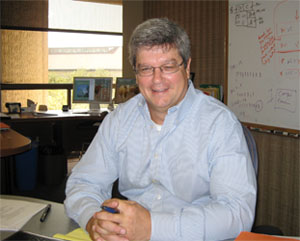In this issue:
- Director’s Message: Becoming a member-driven organization
- Working Groups and User Groups meet in Austin
- DSpace 1.7.2 upgrade process continues
- New Vireo release fixes several bugs
- Tech Teams Update
- November Training to be held at Texas A&M
Director’s Message: Becoming a member-driven organization
Dear TDL colleagues,

TDL Director Mark McFarland
As the Texas Digital Library continues its efforts to become a truly member-driven organization, I want to take the time to highlight the work of our working groups and user groups, which met this month in Austin.
TDL Groups provide an essential venue for participation among the Texas Digital Library membership, giving the TDL the guidance it needs to steer our services in the best direction for our members and providing avenues for mutual support and education.
Our user groups serve several important purposes for TDL, from providing insight to the TDL staff into how members use TDL services and determining areas of need to providing members and sometimes even users outside the TDL consortium with a community of support for sharing best practices in the use of TDL services.
Similarly, our working groups are taking on tasks that are of enormous importance to the consortium, including the development of preservation policy and the design of metadata training and standards for metadata creation.
At the series of meetings held October 25-26, we were especially grateful to welcome Dana Rooks, Dean of Libraries at the University of Houston and Vice-Chair of the TDL Governing Board, who led a discussion with each group about its purpose, structure, and needs. These discussions will inform the strategic planning that the TDL Governing Board will undertake later this fall.
In the weeks and months to come, additional member-driven groups and committees will be formed that will drive our future success and ensure that the Texas Digital Library is an organization focused on the needs of its member organizations and the people who use its services.
If you want more information about TDL Groups, I encourage you to read the report in this newsletter on our fall meetings, visit our website at http://main-migrate.tdl.org/groups, and contact us with any questions.
Sincerely,
Mark McFarland
TDL Director
TDL members gather for working group and user group meetings
TDL held a series of meetings in late October to give members the opportunity to convene user groups and working groups and attend training sessions.
The fall meetings consisted of two days of working group and user group meetings followed by two days of DSpace and Vireo training. All events were held in the Perry-Castaneda Library on the campus of UT Austin.

Dana Rooks, Dean of Libraries at the University of Houston, met with each group in her role as Vice-Chair of the TDL.
Dana Rooks, Dean of Libraries at the University of Houston, was in attendance at the meetings in her role as Vice-Chair of the TDL Governing Board. Her purpose in attending was to learn more about the activities of the groups and garner feedback from members about how they can be most effective in their contributions to the TDL and fellow members.
Working Group Meetings
The TDL Preservation Working Group and Metadata Working Group held meetings in the morning and afternoon of October 25, respectively, to continue working towards goals set for the coming year.
Preservation Working Group
The Preservation Working Group continued its work to develop a policy framework for a TDL preservation infrastructure, based on the CRL’s “10 Principles” for a preservation repository. (See the September 2011 newsletter for more on this project.)
Metadata Working Group
The Metadata Working Group continued work on a data dictionary for images and datasets and discussed further metadata training opportunities and plans for the TDL metadata website at http://blogs.tdl.org/metadata.
User Group Meetings
Two TDL User Groups – the Vireo User Group and the Services User Group – met on Wednesday, October 26. The purpose of these groups is to provide mutual support in the use of TDL services, as well as to interact with the TDL staff to make these services more effective for users.
Vireo Users Group

TDL developer Joseph DeVries talks with the Vireo Users Group about plans for future software development.
The Vireo Users Group met in the morning of October 26 to discuss past and future software development on Vireo, with an emphasis on how the VUG has worked with the TDL development team to prioritize bug fixes and feature enhancements. TDL software developer Joseph DeVries discussed the most recent upgrade to Vireo 1.2, which includes two key bug fixes, as well as plans for future development. (See story on Vireo 1.2 release in this newsletter for more information.)
Services User Group
A new TDL user group met for the first time on Wednesday afternoon: the TDL Services User Group, led by Mira Greene (UTMB) and Sarah Sutton (Texas A&M-Corpus Christi). The mission of the group is to serve as a community for librarians and library staff responsible for implementing TDL scholarly communication services, including Open Journal Systems, Open Conference Systems, WordPress, MediaWiki, and DSpace.
During Wednesday’s meeting, the group refined its mission and organizational structure in preparation for future work.
For more information about TDL Groups, visit the TDL website.
Vireo 1.2 release includes bug fixes, troubleshooting enhancements
 The TDL development team is preparing to release Vireo 1.2, an incremental release that fixes two bugs and provides some log enhancements to enable better trouble-shooting by TDL support staff.
The TDL development team is preparing to release Vireo 1.2, an incremental release that fixes two bugs and provides some log enhancements to enable better trouble-shooting by TDL support staff.
The new release contains fixes for two persistent bugs, as well as made other miscellaneous fixes. The issues addressed in the new release are described below:
- Previously, a fatal error was produced when a student submitter entered a full birth date in the “birth year” field. Now, if a submitter incorrectly enters the full birthdate, he or she receives a validation message asking them to correct the field.
- Previously, when an administrator edited an abstract, the action would cause certain special characters to become corrupted. The problem was identified and solved by Bill Ingram of the University of Illinois.
- TDL has made several behind-the-scenes improvements, including enhancements to logging and documentation, and the copyright and software version were added to the interface footer.
A staging version of Vireo 1.2 was set up for testing by UT Austin in mid-October, and will be rolled out to other member institutions in the coming weeks.
The decision to move forward with the two high-priority bug fixes was made in collaboration with the co-chairs of the Vireo User Group, Stephanie Larrison (Texas State University) and Laura Hammons (Texas A&M University).
Future Vireo Development
Substantial development on Vireo is planned for the coming academic year and was discussed at the Vireo User Group meeting on October 26.
The first step in that development will come later in the fall of 2011, when the team will create a plan for making internal improvements to the Vireo codebase that will enhance TDL’s ability to respond more quickly to bug fixes and make feature enhancements.
Progress continues on DSpace 1.7.2 repository upgrades

Late this past summer, the Texas Digital Library production team began the process of upgrading all TDL-hosted institutional repositories to DSpace 1.7.2, the latest version of DSpace.
Starting with the hosted repositories that contain the most assets, the team is working in batches to set up staging instances of member institutional repositories in DSpace 1.7.2 for testing and then moving them to production.
Currently, the TDL has upgraded the production repositories for UT Southwestern Medical Center, Texas A&M Galveston, and Texas Tech University and has set up “stage” repositories for UT Brownsville and the University of Houston.
After repository managers at these institutions have thoroughly tested and are satisfied with the new version, each institution will be placed in a queue to go live with the DSpace 1.7.2.
Each staging repository contains a clone of the current production repository database, and the database will be re-synched once testing is complete and the new repositories go “live.”
The TDL will continue communicating with repository managers as it sets up new staging versions of the repositories.
About DSpace 1.7.2
The TDL Wiki contains information about some of the new features and improvements in the latest version of DSpace. Please read this documentation and refer to the DSpace Users Manual to learn about new and existing functionality in the new version.
Tech Teams Update
The Tech Teams Update highlights the work of the TDL technical staff, which is divided into three groups: a software development team, a production team, and a first-line support team.
Software Development
- Completed development on Vireo 1.2 (see story above).
- Attended a DuraSpace webinar on DuraClou and began evaluation of DuraCloud as a potential component for preservation infrastructure.
Production
- Continued upgrades to DSpace1.7.2 (see story above).
- Assisted with website support and second-level support issues escalated from the Helpdesk.
Support /Helpdesk
- The support team assisted with the resolution of support tickets that came through the helpdesk.
- Launched a toll free number (855-495-4317) for accepting help questions from TDL users.
November training courses to take place at Texas A&M

The Texas Digital Library will hold two training courses in November at Texas A&M University in College Station. You can register online for these courses at the following link: http://www.surveymonkey.com/s/november2011_training
November 17, 2011
Creating and Managing Electronic Journals with OJS
Texas A&M University
Room TBD
9:00 AM – 4:00 PM
November 18, 2011
Online Conference Management with OCS
Texas A&M University
Room TBD
9:00 AM – 4:00 PM
Registration for these classes is FREE.
To register or to find more information about TDL training, including accommodations in College Station, please visit the TDL website at: http://main.tdl.org/training
Anyone wishing to host a training session on their campus, please contact the TDL at info@tdl.org.
